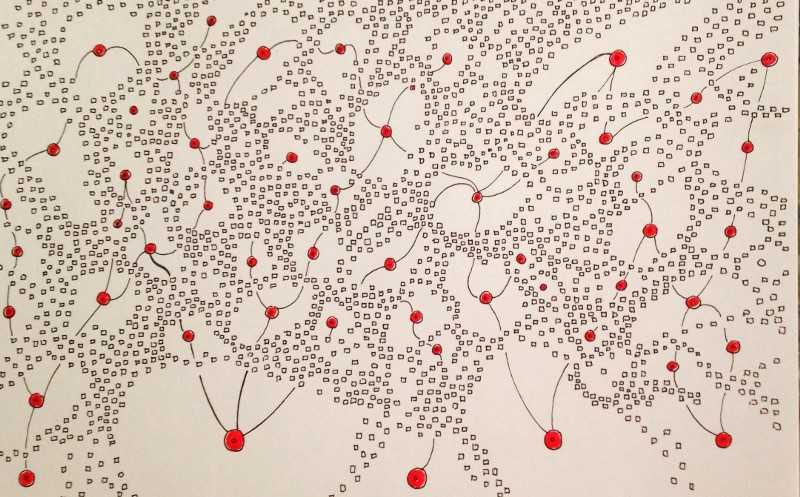What do you need? What does your company need? Why? What are you trying to achieve? What must you optimize for?
Doodling while thinking about the “real” org chartChange is not difficult. Agreeing on what to change — what you need — is difficult. Resistance to change is not static. It is active and tightly wound … a system of competing change initiatives. This is why it is easy for consultants to plot the “right” way forward, but no silver-bullet to actually enact that change.
Need is a tricky topic. Individuals have needs. Individuals band together as teams, and those teams express the amalgam of individual needs. In theory we develop a product that addresses the needs of our customers, partners, and “market”. These complex systems develop ecosystem-like needs of their own.
Here’s a list of needs expressed at a recent retro I facilitated:
Long, mid, and short term economic outcomes for the organization
Long, mid, and short term economic outcomes for individuals
Improving outcomes for customers
Addressing the needs of the user when there is a customer/user differentiation
Individual challenge and skills development
Increased sphere of influence for individuals
Opportunity to practice craft (e.g. “good design”, or “clean code”)
Advancing a cause, disruptive change, mission, or fundamental shift
Eliminating frustration, “busy work”, focus on optimization and “smooth sailing”
Maintaining unity, harmony, quality of personal relationships. Community building
Preserving / defending psychological safety Consider an example.
A UX team member is advocating for a solution that will contribute to the organization’s long term economic outcomes, meet their definition of a “good job”, increase the influence of UX in the organization, and let them notch a win which assures their mid-term economic survival.
Meanwhile the product manager advocates for a solution that addresses short term economic realities, only marginally improves customer outcomes, and maintains a healthy (but perhaps less optimal) harmony between stakeholder needs. Who is right? Throw in another hundred people into the mix. Who is right now? Is there a right answer? No. But some things most certainly have a negative impact:
- Assuming your past experiences qualify you to interpret future needs, or that your organization’s needs today will resemble its needs in the future
- Lacking fundamental psychological safety in your organization. Are people free and safe to express their needs and perspectives?
- Expecting to change individual value systems. You might help someone become more at peace with their values, or show more empathy for the needs of others, but trying to change what they value is a tall order
- Assuming someone isn’t motivated because they don’t care about the same things you care about.
- Assuming you’re talking about the same thing when you say something like “user friendly” or “agile” or “pivot”. Shared understanding matters
- Failing to express your own needs as your own needs. Instead of saying “it is important for me to consider the customer in this case” you advocate for a methodology, or directly attack the motives of a team member. Are you communicating your own needs effectively?
- Assuming everyone cares about the economic success of the business in the same way. Some people don’t care at all, or they prioritize customer outcomes over business outcomes, or they care primarily about short/long term outcomes. What can you leverage in this case for everyone’s mutual benefit?
- Assuming a person’s passion for a point of view is proportional to the amount of time they spend complaining about it. They might care, but not really care. Or they may be afraid, and choose not to voice their deep concerns. This is what I’ve been mulling on today.
What do I need? What do you need?It’s a good start.
